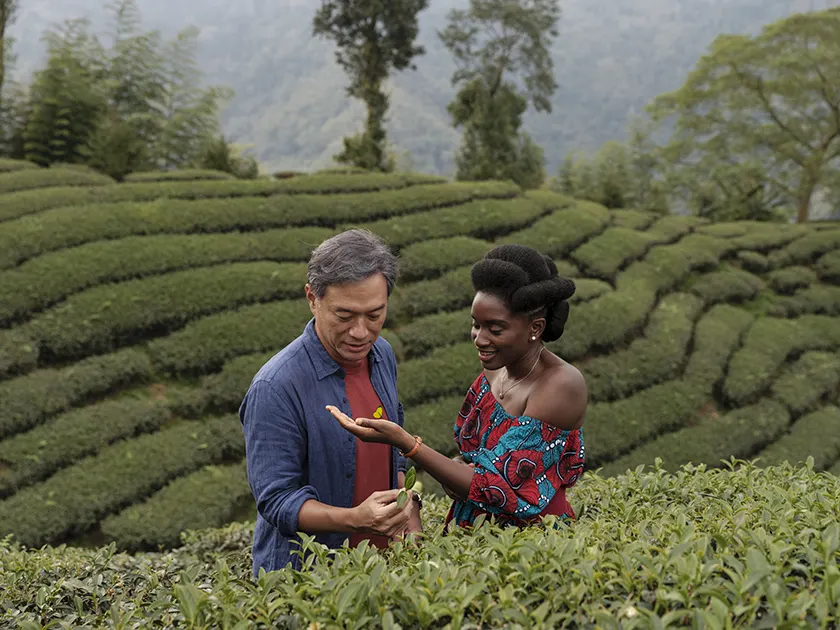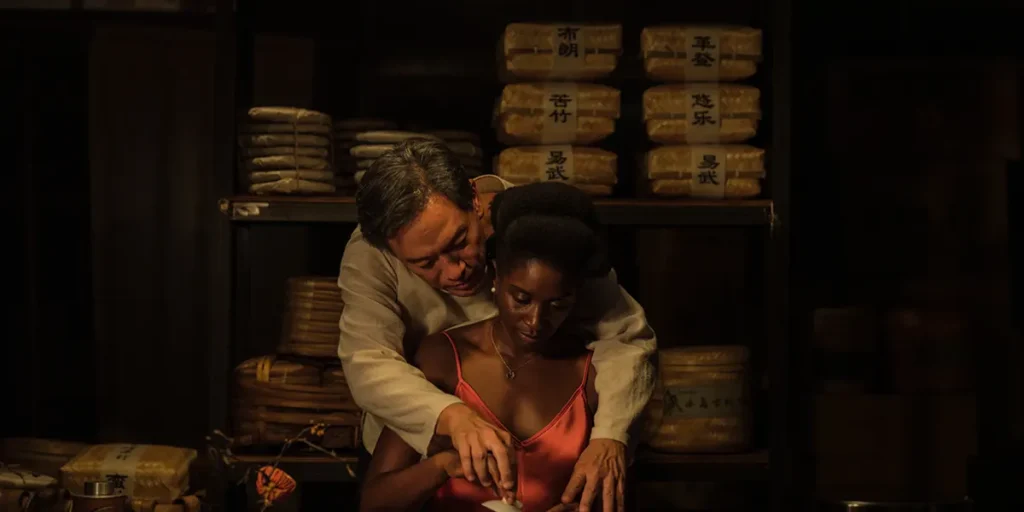Black Tea takes inspiration from Wong Kar-Wai to show us a thriving African diaspora in the midst of a Chinese metropolis, and a love story that blooms within.
Director: Abderrahmane Sissako
Genre: Drama, Romance
Run Time: 111′
U.S. Release: May 9, 2025
U.K. Release: TBA
Where to Watch: In theaters in New York and Los Angeles
Black Tea starts with the wedding of Aya (Nina Mélo), a young Ivorian woman, who dramatically says no and runs off. She moves to the Chinese city Guangzhou, a huge trading hub and home to a thriving African diaspora. There, she works in a small tea store with Cai (Chang Han), a middle-aged Chinese man. They begin to fall in love, but their past keeps looming in the distance and threatens to destroy their present.
A melodrama of love, past mistakes, and prejudices emerges with a breathtaking visual style.
Black Tea excites with a glimpse into a part of the world most people won’t even be aware of. African people speaking fluent Mandarin are living in the midst of a Chinese metropolis. Both cultures exist parallel to one another but touch at their core pillars, in the process of creating a new, colorful cultural existence. The beautiful Chinese architecture and lights of the city illuminate the vibrant African clothing. A perfect example is the Black-owned beauty shop Aya frequents that exists right next to a Chinese street market.
It’s impossible to talk about Black Tea without mentioning master filmmaker Wong Kar-Wai, whose influences can be felt in every frame. It’s not just the vibrant images of the Chinese city captured by Aymerick Pilarski, though the visual style is too iconic to be mistaken for anything else. Despite the massive city around them, the story feels intimate, and like it happens entirely between Aya and Cai. The atmosphere is dreamy, and the yearning is all-encompassing. There’s a palpable romantic tension between them that is ever-present, with something simmering right beneath the surface that is impossible to latch onto but undeniably felt.

Let us not forget that co-writer and director Abderrahmane Sissako is an Oscar-nominated filmmaker in his own right, though. While Wong Kar-Wai must’ve been a huge influence and guiding light in the making of Black Tea, it’s Sissako’s ability as a filmmaker that keeps it from feeling like a cheap copy. And so, at the edge of this love story, there’s also a reminder that, for as beautiful as this mixed society looks from the outside, there are still two different cultures clashing within. Some people just see the worst in one another and can’t get past the differing lifestyles they represent.
While the movie does navigate heavier topics, it never loses track of that feeling of lightness with which it presents itself. Part of that is the purposeful aesthetic execution that captures you in its dreamy atmosphere. But another part is also that the screenplay by Abderrahmane Sissako and Kessen Tall doesn’t really seem to know what to do with the more serious commentary outside the romance. Black Tea progressively loses its tracks until it eventually completely falls off the rails and leads us to an ending that is so clichéd it is frankly a bit embarrassing.
A huge part of Wong Kar-Wai’s style is also his particular use of music, and director Abderrahmane Sissako seems to have taken some inspiration here as well. But where he gloriously succeeds in adapting Wong Kar-Wai’s visual style to his own sensibilities, he completely falls on his face with the music. The score from Armand Amar tries so hard to reach that same romantic mood the images convey so effortlessly that it ends up feeling overwrought and schmaltzy. The needle drops similarly don’t work at all and only break the otherwise so carefully crafted tone.
But the fantastic leading duo of Chang Han and especially Nina Mélo ground the whole piece for as long as they need to, and carry the movie with their chemistry. Every look the two share is magical, and the scene in which Cai shows Aya how to brew tea is deeply sensual as he guides her hand and they share deep breaths to take in the aroma. Abderrahmane Sissako shows he knows what he’s doing with this Wong Kar-Wai pastiche and creates a beautiful aesthetic exercise that envelops you in its warm images.
Black Tea: Movie Plot & Recap
Synopsis:
After running away from her wedding, Aya moves to Guangzhou where she lives among a thriving African diaspora in the midst of a Chinese metropolis. There, she works with Cai in a small tea shop and the two soon fall in love.
Pros:
- stunning visuals
- clear aesthetic identity, even if heavily inspired by another artist
- dreamy atmosphere and a deeply romantic mood
- interesting and unique setting
- great chemistry between the two leads
Cons:
- messy script that doesn’t know what to do with its heavier topics
- awful ending
- complete misuse of music
Black Tea is now available to watch in theaters in New York and Los Angeles.

